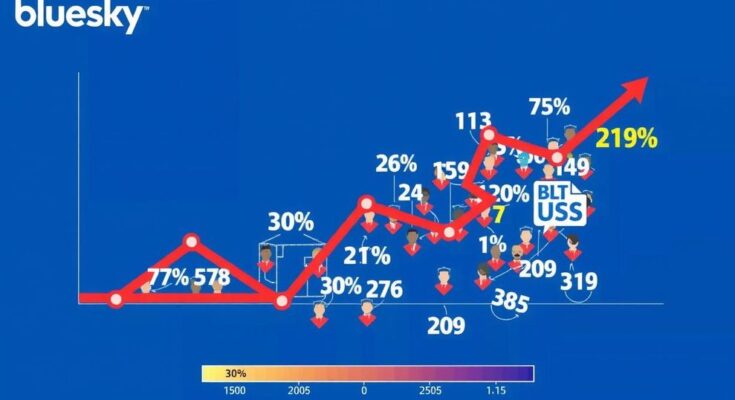Bluesky has significantly increased its user base from 9 million to 14.5 million, gaining approximately 700,000 new users in just a week after the recent US elections. The platform’s growth is largely attributed to dissatisfaction with X, owned by Elon Musk, particularly due to controversies surrounding misinformation and Musk’s political affiliations. Public figures are notably migrating to Bluesky, seeking a more congenial online environment.
Bluesky, a social media platform initially developed under Twitter’s umbrella, has recently reported a significant increase in its user base following the US elections. As of November 12, 2024, Bluesky’s membership has surged from 9 million in September to 14.5 million, bolstered by 700,000 new users in just one week. The growth is primarily attributed to dissatisfaction with the X platform, owned by Elon Musk, particularly due to his support of President-elect Donald Trump and increased instances of misinformation on X. A multitude of public figures and everyday users alike have thus migrated to Bluesky, seeking a healthier online environment. Additionally, notable politicians such as Congresswoman Alexandria Ocasio-Cortez have re-engaged with Bluesky, expressing relief at finding a more congenial digital space. This trend of switching from X to Bluesky follows earlier spikes in Bluesky’s activity during times of political unrest, indicating a broader pattern of user migration towards platforms perceived as more user-friendly and less divisive. With its decentralized model, which promotes interoperability among different online communities, Bluesky offers an alternative to traditional social media, resembling X in interface but differing in ethos.
Bluesky was originally conceptualized in 2019 as part of Twitter and became an independent entity upon its official launch in 2021. Under the leadership of its owner Jay Graber, it embraces a decentralized approach to social media, allowing various platforms and communities to interact instead of consolidating under a single corporate framework like Twitter or Facebook. Despite its emphasis on decentralization, Bluesky’s user interface remains similar to that of X, particularly as it incorporates features such as direct messaging. The platform recently positioned itself as a viable alternative, especially appealing during periods of unrest or controversy surrounding larger platforms. The recent surge in Bluesky’s user base has been attributed to growing dissatisfaction with X, fueled by perceived biases and increased misinformation under Elon Musk’s ownership. This shift follows a trend of notable individuals, including politicians and public figures, expressing their discontent with X and opting to join Bluesky for a more fulfilling online experience.
In conclusion, Bluesky’s substantial growth following the recent US elections underscores a clear shift in user sentiment towards platforms that prioritize a more respectful and genuine online community. The frustrations with X, ignited by its ownership’s controversial stance and cluttered environment, have prompted numerous individuals to seek alternatives such as Bluesky. As this new social media landscape evolves, Bluesky’s commitment to decentralization may resonate with users aiming for a more agreeable and professional digital experience. This trend illustrates a potential shift in social media use, suggesting an increasing demand for platforms that align with users’ expectations for integrity and engagement.
Original Source: news.sky.com




